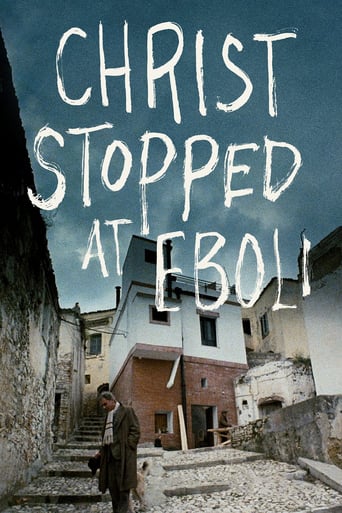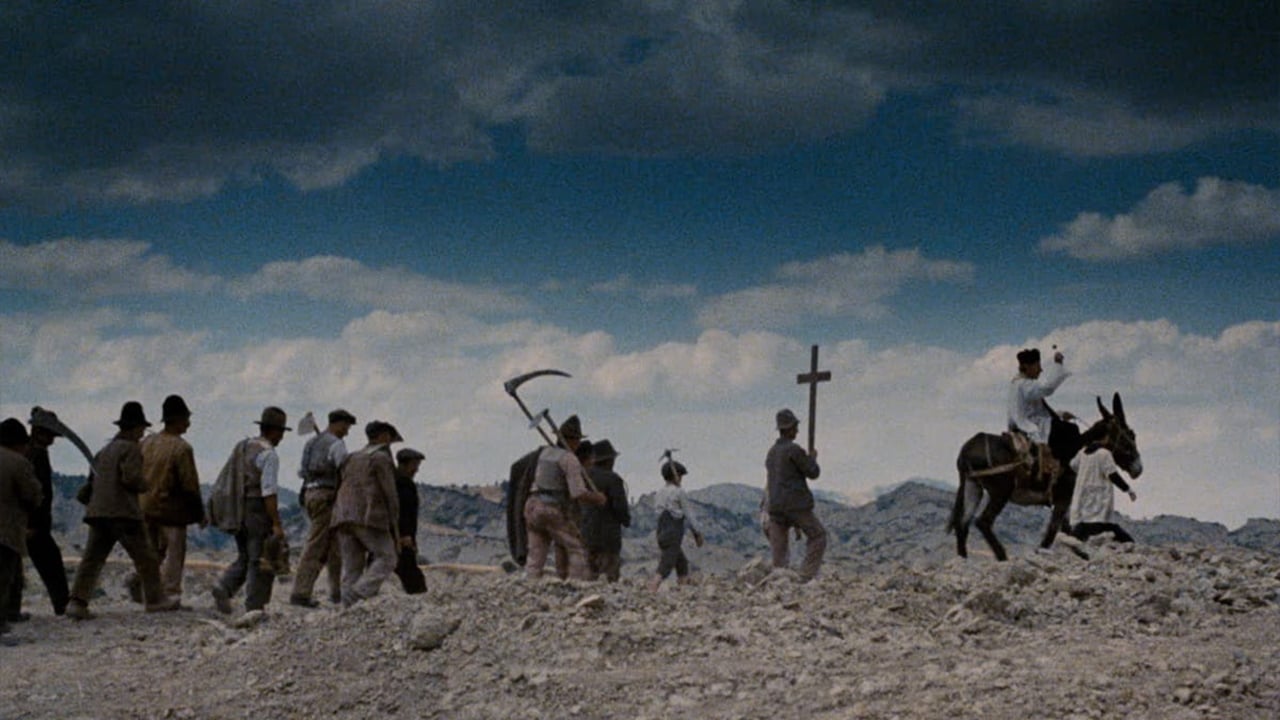Jackson Booth-Millard
I knew nothing about this Italian film until I found it in the book 1001 Movies You Must See Before You Die, without this recommendation I would certainly not have watched it, directed by Francesco Rosi (Three Brothers (Tre Fratelli)). Based on the real-life memoir, Carlo Levi (A Fistful of Dollars' Gian Maria Volontè) is an intellectual, painter and writer, he also has a degree in medicine. He was arrested in 1935 by Mussolini's regime for his anti-fascist activities, and following his release he is forced into exile, and went to live in a small, isolated village in a remote town in Southern Italy, in the region of Lucania, known today as Basilicata. The landscape is beautiful, but the village is populated by poor and neglected inhabitants, barely surviving on the meagre harvest of the unyielding land. Eboli, the closest train station, is the last outpost of civilisation (such as it is), according to the local tales, even Christ, in his southward journey, went no further than Eboli, beyond that point there is only abandon, neglect, desolation and human despair. With local doctors not interested in peasants, and not trusted by them, Carlo begins to help the villagers in any way can, over time, he learns to appreciate the beauty and wisdom of the peasants, and to overcome his isolation. Also starring Paolo Bonacelli as Don Luigi Magalone, Alain Cuny as Barone Nicola Rotunno, Lea Massari as Luisa Levi, Irene Papas as Giulia Venere and François Simon as Don Traiella. The performance of Volontè is subtle but fine, there is not very much that happens in this film, and it is almost two and a half hours long, but perhaps that is the point, because the landscape is full of mostly misery, it certainly has memorable imagery, a fairly interesting drama. It won the BAFTA for Best Foreign Language Film (the first foreign film in history to do so). Worth watching!
helene kahn
this movie did more than any other Italian film i've seen to interest me in italy itself--the people, the land, the culture. it also opened my mind to the intelligence of the uneducated among us--i loved that guilia was so real and right-n and so full of peasant superstition that in no way interfered with her ability to "get it." i have begun to travel in italy and having seen this film i am driven to see the south and visit the carlo levi house and museum. his paintings see into the object, to me, like a quality black and white study which i find the most expressive medium. as soon as i see the faces in the beginning of this film, i am drawn in. i found the melancholy music somewhat sentimental (like the music in truffaut's films) but a necessary comfort.
jotix100
Carlo Levi, an Italian who fought against the arrival of Fascism in his native Torino, was arrested for his activities and sent to exile in the Lucania region of the country, now known as Basilicata. The hill town of Gagliano was to be his home for the time he had to serve. This was the Italy of the 1930s where the rise of Mussolini and his quest for conquering Ethiopia, an ill conceived idea from the start.We watch as Dr. Levi arrives at the Eboli station, where he must change to a local train and a taxi in order to reach the hill town, which was also the home of other political prisoners. Right after Levi descends from his train at Eboli, he sees Barone, a dog that has been abandoned and who will become his companion in exile. His arrival in Gagliano causes curiosity among the local folk, who see in him a cultured man who sticks out. Carlo Levi observes the people as he takes his daily walks. He can't help but notice how backward everyone seems to him. At the same time, he gets to appreciate them because even if they are ignorant of the outside world, they are genuine.Levi, who had training as a physician, receives a visit from his sister Luisa, a doctor herself. He comments on the primitive state of medicine in the town, a place that boasts two doctors, who are ineffective and set in their ways. Levi clashes with the mayor, a man who is a devout follower of Mussolini and his movement, because the way he wants to censor his communication with friends. After he receives his release, Levi is not prepared for the way he made his presence felt among the locals who come to see him off.Francesco Rosi, who adapted Carlo Levi's novel, is a director with a strong sense of political awareness. He presents the figure of Carlo Levi as a noble man who was helpless against what he wanted to do for the people of Gagliano, but the local government was not exactly enthusiastic about his meddling in the local affairs. Where he is able to connect with the populace is with his knowledge of medicine. Carlo Levi also painted the people of the region.Gian Maria Volonte was an actor of quiet intensity. He is in almost all the scenes and he expresses a rage with his eyes. Mr. Volonte was the main reason for watching the film. Since he had collaborated with Rosi before, it seemed logical he would portray Carlo Levi in the movies, something that he does with ease and elegance. Others in the film include Lea Massari, as Luisa, Irene Papas as Giuglia, Alain Cluny as the Barone Nicola Rotondo. A favorable impression is made by Paolo Bonacelli, who appears as the mayor Luigi Magalone, who even when censoring Levi showed a lot of respect for him.The actual filming was done in Aliano, an ancient hill town, where the real Carlo Levi went to live after the war. Pasqualino DeSantis, the cinematographer, captured in vivid images the picturesque town, the countryside and the people of this lost city. Francesco Rosi made an interesting film about a man of principle that will live forever.
Alice Liddel
This dutiful, detailed three-and-a-half TV epic describes the exile of dissident intellectual Carlo Levi in a remote village of fascist Italy, blighted by poverty, disease, immirgration and governmental contempt. The film is part-character study, part-socio-historico-political analysis, part careful representation of a people and its place. It is seriously flawed (the people are sentimentalised, the politics are simplistic, the pleasant presentation (music, major actors, cinematography etc.) works against the horrifiic subject matter); but there are nice ironies too, such as the Christlike Levi capable of the fascism he deplores.The film can be seen in two contexts, as a neo-realist riposte to the prominent anti-realist 70s films about Fascism ('The Spider's Strategem', 'The Conformist', 'Amarcord'), and as a prestigious historical epic on a national theme frequent in the 70s and 80s ('The Travelling Players', 'Heimat'). In both cases it falls short.


 AD
AD



